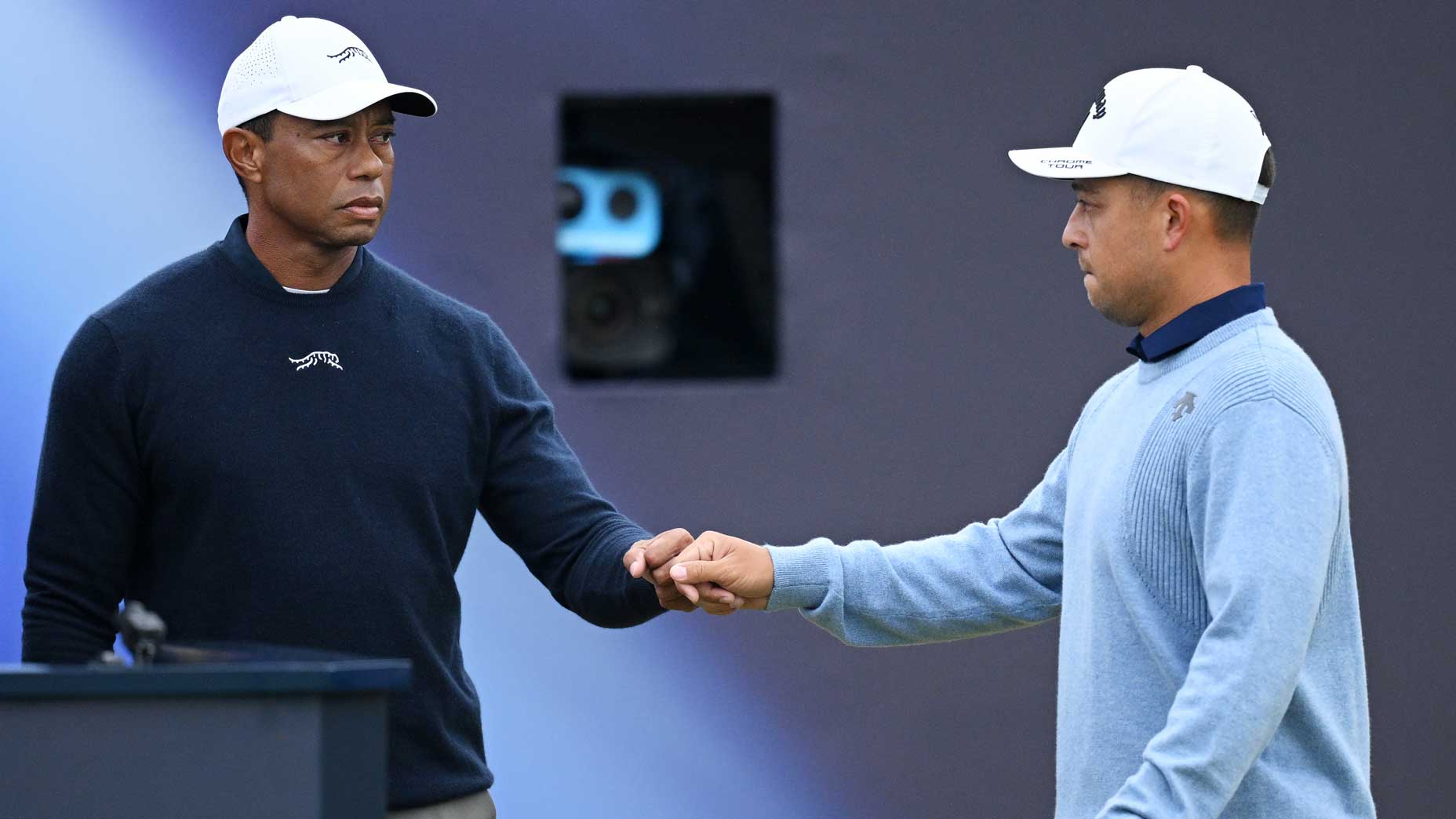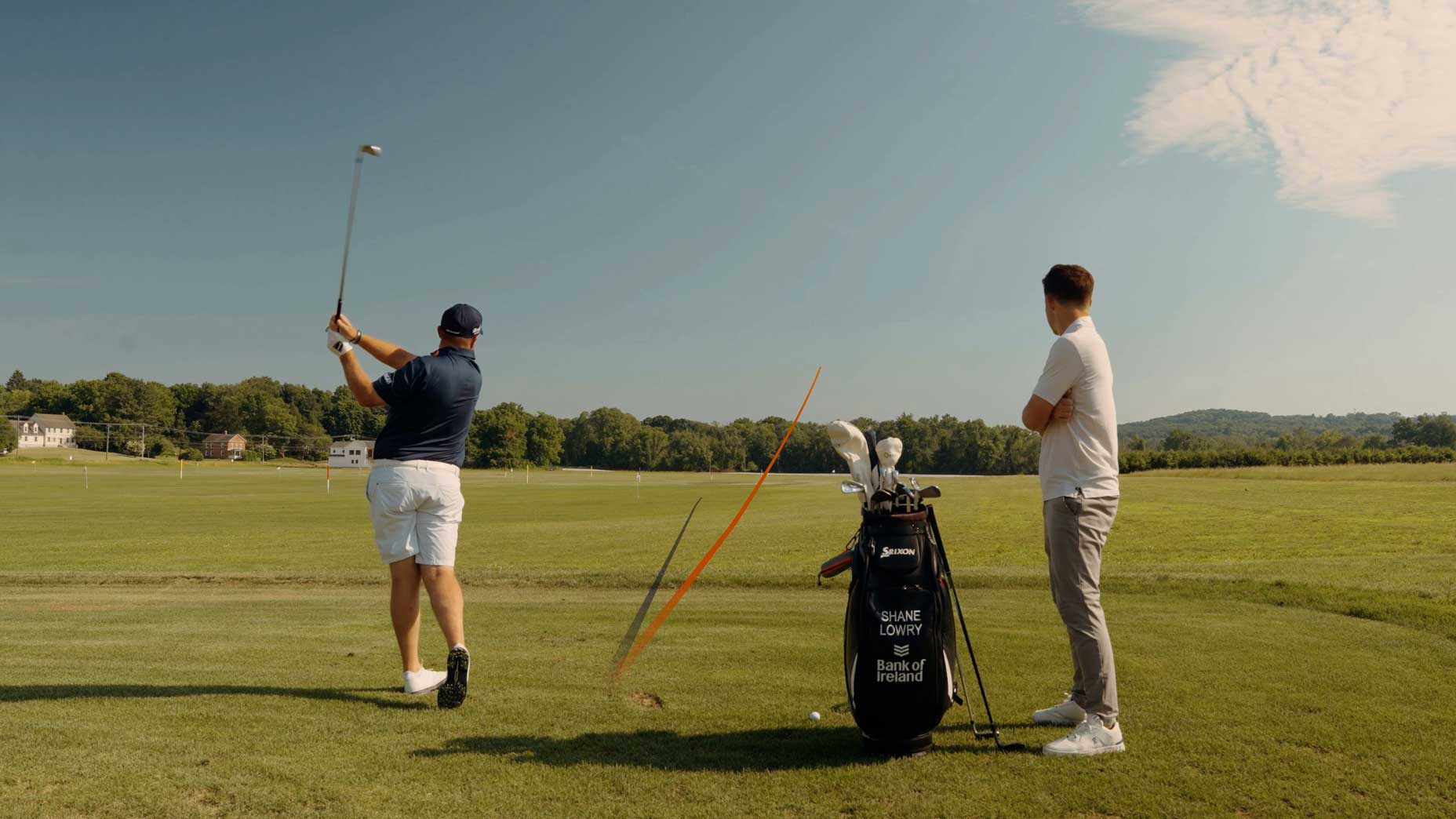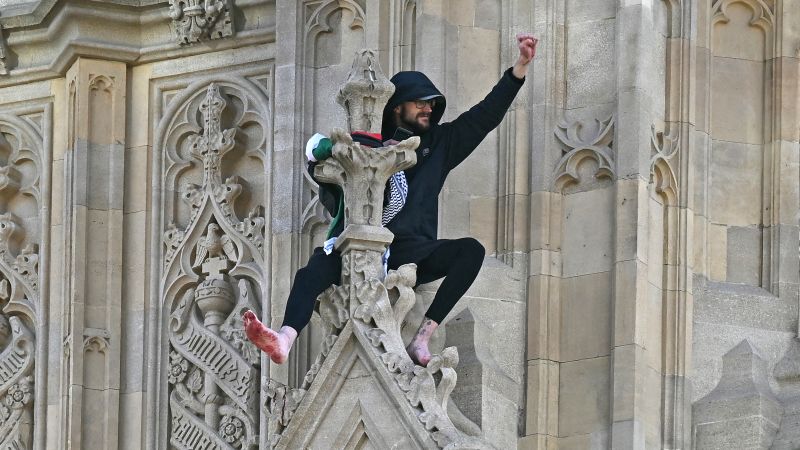This Open is missing its biggest stars. Here’s why there’s hope for the weekend

Some stars, like Tiger Woods, are out of the Open while others, like Xander Schauffele, remain
Getty Images
There’s a strange melancholy to the halfway mark of the Open Championship.
For golf fans in the U.K. those first two days are sporting festivals, with proper golfers facing proper golf tests from sunup to sundown, some small seaside town overrun with enthusiastic spectators, lively chatter about what could be on the rope line and at the pubs, the tournament bursting at the seams with possibility. For American fans those first two days are a rare joy, too: an excuse to stay up late or get up early, to feel some childlike excitement turning on the TV to see what’s already unfolded in the elements across the pond.
By Friday night that’s done. The infinite possibilities of what could be have been replaced by a smaller, finite set of potential weekend outcomes; it’s natural to do some grieving for what could have been. Take Tommy Fleetwood, for instance, who grew up several hours down the coast from Troon, has been one of the game’s most consistent performers on links courses and seems destined to win one of these at some point. But when he double bogeyed the ninth hole on Friday it became clear that this would not be his year; he wouldn’t even make the weekend.
“Yeah, look, conditions are tough, the golf course is tough. But it’s your job to figure it out and to put in a score, and I just couldn’t do that,” he said. “I’ll reflect and start again.”
That weighty Friday feeling has only increased this past half-decade, when the PGA Championship pivoted to May and the Open became the final men’s major of the year. For golfers this event now means one last chance to claim a life-changing title before the long wait for next year’s Masters begins. Avid golf fans face a reality almost as jarring: major championship season denotes summertime, and when the long nights of the Open Championship have come and gone, the possibilities of the season have, too.
Fleetwood is hardly alone in his disappointment leaving Royal Troon. Even as a fan favorite and pre-tournament betting favorite he’s still not among the biggest names to head home early.
There’s Tiger Woods, still gamely fighting his fight against Father Time, who has come back from injury and looked progressively healthier each tournament this year but has run into the equally insidious challenge of rust. He made the cut at the Masters but wasn’t close at the next two and wasn’t close this week, either, bowing out at 14 over par and beating just a handful of competitors.
There’s Rory McIlroy, who suffered a heartbreaking defeat at Pinehurst in last month’s U.S. Open but seemed destined to bounce back and contend at Troon — but then he bombed out with a seven-over 78 in the opening round and was another six over par in his first six holes Friday, by which point his mind was wandering to vacation, a far less consequential quest than that for a fifth major after a decade sitting on four.
There’s Bryson DeChambeau, the man who beat McIlroy at Pinehurst, one of golf’s great characters and competitors, who was having the best major season of anyone in the world before he shot nine-over par for two days and headed for the exits early.
There are others, too. Ludvig Aberg, who has climbed to World No. 4 in his first full PGA Tour season but shot nine over for two days. World No. 5 Wyndham Clark, whose mystifying major play continued with a two-day total of 16-over par. Viktor Hovland, who is still searching, and Sahith Theegala, still looking for his best at the biggest moments, and Tom Kim, a trendy pick this week, and Tony Finau, whose opening 71 was betrayed by his Friday 81 and Keegan Bradley, who hopes to play his way onto the Ryder Cup team he’ll captain next year but who missed the cut by one agonizing shot. Their stories have reached their end for this major season. See you in April.
This remains the beauty of cut lines. Friday evening at the Open can be about those guys — their could-have-beens and missed opportunities. That’s fine. But Saturday we get something far cheerier: a mad dash to the finish at the year’s final major. This third round is no exception: beyond the flashy absences this is a tournament bursting with potential weekend drama.
At the top there’s Shane Lowry, proud Irishman, who this year is celebrating the five-year anniversary of his storybook triumph at Royal Portrush and would very much like to do so by lifting the claret jug again. He leads by two at seven-under par after a turbulent Friday that served as a reminder of just how much fun it is to watch him scrap his way through the elements.
There are the Englishmen in second place at five-under par, Justin Rose and Daniel Brown, the former an aging thoroughbred chasing another day in the sun and the latter an unproven, unheralded dark horse whose first moment in golf’s limelight came Thursday afternoon.
There’s the imposing presence of Scottie Scheffler in T4, just three players and five shots separating him from the lead. He’s the second betting favorite behind Lowry and it’s easy to see why; there’s an inevitability to his presence on these leaderboards and in a year as dominant as his it would feel strangely lacking if he won just a single major.
There are LIV golfers without majors and with uncertain futures chasing world ranking points and prestige and a long-term place in these events, guys like Dean Burmester in T4, five back and Joaquin Niemann in T11, seven back. There are LIV golfers with multiple majors chasing one more, notably the trio of Jon Rahm, Dustin Johnson and Brooks Koepka — each lurking at one-over par, eight shots back.
There’s the fascinating duo of Xander Schauffele and Patrick Cantlay, frequent practice-round sparring partners and U.S. teammates with remarkably similar careers — similar, that is, until Schauffele won this year’s PGA Championship. The two played together Thursday and Friday and they’re paired together on Saturday, too. It’s plausible by Sunday evening Cantlay could now draw equal or that Schauffele could ascend to the game’s next level. One major is table stakes for a great career, after all. Two gets you invited to a different party. There’s a former World No. 1, Jason Day (T7, six back) looking for his second, too, fully familiar of the joys of one and the desire for one more.
There are PGA Tour players whose solid careers could elevate with a win, guys like Billy Horschel (T4, five back) or Corey Conners (T7, six back). And there’s a pesky U.K. underdog, England’s Matthew Jordan (T11, seven back), who has invited himself to weekend contention for the second year in a row.
Mostly there’s Troon, its coastline and its pot bunkers and the wind that whips off the former and through the latter. And there’s the institution of the Open, and of golf’s majors, which have proven their strength even as other foundations of the game have shaken. The players matter, of course. Their star power matters. But the way they gather here, the way they play for the claret jug in this setting — the tournament remains greater than the individuals comprising its field. So it’s worth mourning the absence of some of the field’s star-studded blue-chippers Friday night. It’s worth considering, over a pint, what could have been but will not be.
Then it’s time to rest up for the conclusion of the Open Championship, its two final, glorious rounds, knowing just how much you’ll miss it when it’s gone.
Dylan welcomes your comments at dylan_dethier@golf.com.
Related
5 Things I Never Play Golf Without: David Dusek
Our 11-handicap equipment writer always brings his favorite divot repair tool, a portable speaker and some high-tech gear to the course.As long as the weather i
Donald Trump’s golf course wrecked by pro-Palestine protesters
Pro-Palestinian protesters have vandalized parts of U.S. President Donald Trump's golf course in Scotland in response to his proposal for the reconstruction of
Man holding Palestinian flag scales London’s Big Ben hours after…
CNN — Emergency services were called to London’s Palace of Westminster on Saturday a
EPD: Drunk driver parked car on golf course
EVANSVILLE, Ind. (WFIE) - Evansville police say they arrested a man after finding him drunk in his car that was parked on a golf course.Officers say they were c













